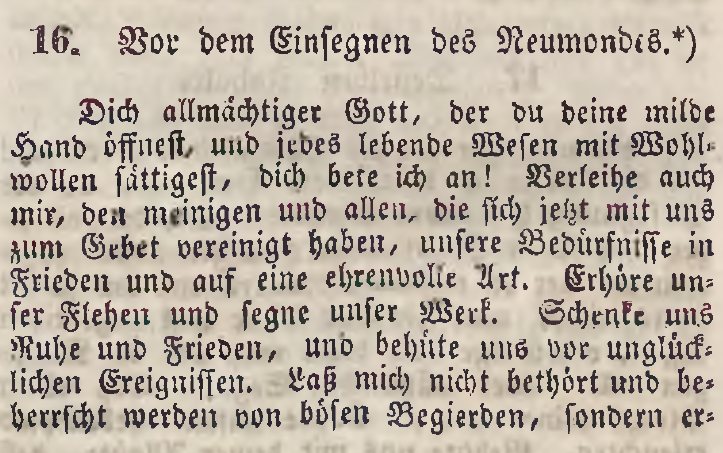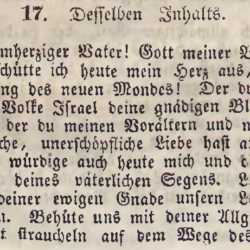| Source (German) | Translation (English) |
|---|---|
Für das Wochenfest. (שבועות) |
For Shavuot. (שבועות) |
Als Israel aus Egypten auszog, von dem Volke der Barbaren, da wurde Juda sein Heiligthum, Israel sein Reich (Psalm 114, 1-2). |
When Yisrael went out from Egypt, from the people of the barbarians, Yehudah became its sanctuary, Yisrael its kingdom (Psalms 114:1-2). |
Gesegnet sei die Erinnerung die der heutige Tag in uns weckt! — Heute, am sechsten Tage des Monats Siwan, hat sich offenbart deine Absicht, Allgütiger, mit dem Volke Israel beim Auszuge aus Egypten. Zahlreich und kräftig stand dein Volk da, im Genuß der Freiheit, aber die schönste Zier fehlte ihnen, Gesetz und Religion. Da ließ sich deine Majestät auf Sinai nieder, Wolken, Dampf, Nebel und Finsterniß hüllten den Berg ein; Feuerbrände zeigten sich, Stimmen und Posaunenschall ließen sich hören, und in zehn großen heiligen Worten thatest du ihnen deine Lehre kund. Diese Erscheinung hat unsere Väter von der Wahrheit und Würdigkeit der Lehre überzeugt, und den Bund besiegelt, den Gott mit den Urvätern Abraham, Isaak und Jakob und mit ihnen selbst geschloßen hatte. Eine so außerordentliche Herablassung Gottes gegen Menschen, hat sie mit einem festen Vertrauen auf deine göttliche Gnade und mit dem Glauben an die Wahrhaftigkeit deines Dieners Moses erfüllt, den du zu dieser erhabenen Sendung ausersehen hattest. Diese wundervolle Offenbarung war eine Quelle des Heils, die lechzende Seele zu laben, und das sehnsuchtsvolle Verlangen nach Glück und Beseligung zu befriedigen. |
Blessed be the memory that today awakens in us! — Today, on the sixth day of the month of Sivan, your intention, O All-Good One, was revealed to the people of Yisrael when they came out of Egypt. Your people were numerous and strong, enjoying freedom, but they lacked the most beautiful adornment, law and religion. Then your majesty settled on Sinai, clouds, steam, mist and darkness enveloped the mountain; fires appeared, voices and trumpet sounds were heard, and in ten great holy words you announced your teachings to them. This appearance convinced our fathers of the truth and worthiness of the doctrine and sealed the covenant that God had made with the forefathers Avraham, Yitsḥaq and Yaaqov [and with each of them individually]. Such an extraordinary condescension of God towards men, filled them with a firm confidence in your divine grace and with faith in the truthfulness of your servant Mosheh, whom you had chosen for this sublime mission. This wonderful revelation was a source of salvation, to refresh the thirsty soul, and to satisfy the longing desire for happiness and bliss. |
Noch heutigen Tages sind die Gebote, die du auf Sinai ausgesprochen, leuchtende Sterne für die meisten Nationen der Welt. Alle halten sie heilig, alle erkennen, daß sie vom Finger Gottes aufgezeichnet sind. — Und sind auch die Tafeln verloren, auf welchen sie eingegraben waren, so graben sie sich selbst mit dem Griffel der Wahrheit in das Herz eines jeden vernünftigen und tugendhaften Menschen. O laß uns, Allgütiger, stets der Wahrheit treu bleiben! Die Lehre, die uns Moses geboten, sei ewig ein Erbtheil der Gemeinde Jakobs (5 B. Mos. 33, 4). Laß uns die Wahrheit unserer heiligen Religion immer mehr erkennen, und wenn wir durch die Ausübung deiner Lehre in bedrückenden Verhältnissen leben müssen, laß es uns aus Liebe zu dir freudig tragen. Laß uns stets bedenken, daß wie sich bis jetzt deine Verheißungen erfüllt haben, du auch das erfüllen wirst, was du deinem Volke verheißen hast, wenn sie deine Gebote halten. Möge deine Lehre uns Trost sein im Leiden und unsere Freuden veredlen und heiligen. — Möge sie uns ein dauerndes, inneres Wohlsein, stete Zufriedenheit und Heiterkeit der Seele gewähren, und uns zur Ausübung der Tugend stärken. Das frohe Gefühl deiner göttlichen Liebe und deines Wohlgefallens würdig zu sein, erhebe uns über alle irdische Leiden, und erfülle uns zu jeder Zeit mit der Freude und Beruhigung, die das Vertrauen auf dich deinen Verehrern gewährt. Amen. |
Even today, the commandments which you pronounced at Sinai are shining stars to most of the nations of the world. All hold them sacred, all recognize that they are recorded by the finger of God. — And if the tablets on which they were engraved are lost, they engrave themselves with the stylus of truth into the heart of every reasonable and virtuous man. Let us, O All-Good One, always remain faithful to the truth! Let the teaching that Mosheh commanded us be eternally an inheritance of the congregation of Yaaqov (Deuteronomy 33:4). Let us realize the truth of our holy religion more and more, and if we have to live in oppressive conditions through the practice of your teaching, let us bear it joyfully out of love for you. Let us always remember that just as your promises have been fulfilled until now, you will also fulfill what you have promised your people if they keep your commandments. May your teaching be a comfort to us in suffering and ennoble and sanctify our joys. — May it grant us a permanent, inner well-being, constant contentment and serenity of the soul, and strengthen us to exercise virtue. May the joyful feeling of being worthy of your divine love and good pleasure elevate us above all earthly sufferings, and fill us at all times with the joy and reassurance that trust in you affords your devotees. Amen. |
“Für das Wochenfest [ver. 1]” was translated/adapted by Yehoshua Heshil Miro and published in his anthology of teḥinot, בית יעקב (Beit Yaaqov) Allgemeines Gebetbuch für gebildete Frauen mosaischer Religion. It first appears in the 1829 edition, תחנות Teḥinot ein Gebetbuch für gebildete Frauenzimmer mosaischer Religion as teḥinah №26 on pp. 33-35. In the 1835 edition, it appears as teḥinah №26 on pp. 39-40. In the 1842 edition, it appears as teḥinah №28 on pp. 42-43.
We welcome corrections and improvements. The transcription of the German from Latin script in Fraktur type provided machine-readable text for a machine translation by DeepL, which we then edited for accuracy and clarity. –Aharon Varady
Source(s)



“Für das Wochenfest (שבועות) [ver. 1] | For Shavuot (ver. 1), a teḥinah by Yehoshua Heshil Miro (1829)” is shared through the Open Siddur Project with a Creative Commons Attribution-ShareAlike 4.0 International copyleft license.







![Fürbitte für die Verstorbenen [no.3] (Yehoshua Heshil Miro 1833) - cropped](https://opensiddur.org/wp-content/uploads/2022/03/Furbitte-fur-die-Verstorbenen-no.3-Yehoshua-Heshil-Miro-1833-cropped.png)


Leave a Reply